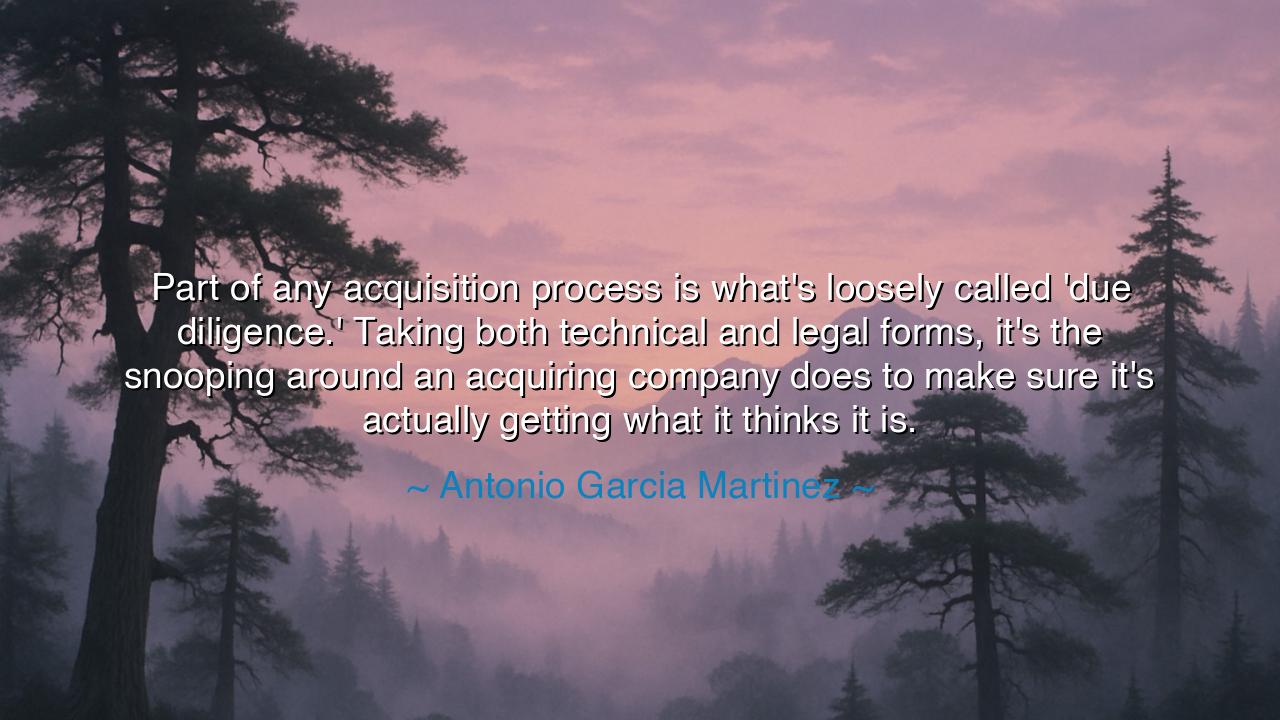
Part of any acquisition process is what's loosely called 'due
Part of any acquisition process is what's loosely called 'due diligence.' Taking both technical and legal forms, it's the snooping around an acquiring company does to make sure it's actually getting what it thinks it is.






The words of Antonio García Martínez, spoken from the battlefield of modern commerce, reveal the hidden labor that lies behind the glories of mergers and acquisitions: “Part of any acquisition process is what's loosely called ‘due diligence.’ Taking both technical and legal forms, it's the snooping around an acquiring company does to make sure it's actually getting what it thinks it is.” Beneath this pragmatic observation lies a lesson both timeless and profound—that before one seizes, one must first understand; before one takes, one must first weigh; before one binds, one must first discern the truth.
At the heart of his words lies the discipline of due diligence. It is not glamour, but vigilance. It is the uncelebrated work of examining contracts, probing debts, testing technology, and ensuring that what appears valuable is not, in fact, poisoned beneath its surface. In commerce, as in life, appearances deceive, and desire blinds. The eager acquirer, like a warrior rushing into an ambush, risks ruin if he does not pause to survey the field. Thus, due diligence is the shield that guards against folly, the lamp that exposes hidden dangers.
History offers us countless examples of those who ignored this wisdom. Consider the tale of the Trojan Horse. The Trojans, in their eagerness for victory and pride in their supposed triumph, welcomed the gift of wood and gold without question. They performed no diligence, asked no questions, and peered into no hidden chambers. Their reward was fire and slaughter, their city undone by their failure to investigate. In contrast, the wise of every age have known that every gift must be tested, every prize examined, every promise verified before it is embraced.
The legal and technical forms of diligence Martínez names are merely the modern faces of this ancient principle. Where once rulers sent envoys to inspect the lands they sought to conquer, today lawyers scour contracts and engineers review systems. Where once kings demanded tribute and samples of harvest to ensure prosperity, now corporations demand audits and verifications. The tools differ, but the spirit is the same: trust is not enough; certainty must be sought before commitment is made.
Yet Martínez’s words also carry a hint of irony, for he calls this process “snooping around,” as though it were an intrusion. And indeed, diligence is not always welcomed by the one being examined. But intrusion in the service of truth is no shame. Just as a physician must probe the wound to know its depth, so too must the acquiring party probe the company to know its true worth. To avoid such examination is not courtesy, but recklessness.
The lesson here extends beyond commerce. In all dealings of life—whether in friendship, alliances, or promises—we must practice diligence. Not the cold suspicion that withers trust, but the wise discernment that prevents betrayal. Before binding yourself to a partner, a leader, or a cause, look deeply. Ask the hard questions. Search for the truth beneath the shining surface. For only then will your commitments be firm, your alliances secure, and your labors fruitful.
Therefore, children of tomorrow, remember this teaching: diligence is the mother of wisdom. Do not rush headlong into commitments dazzled by promise. Examine, test, discern. For it is better to uncover a flaw before you bind yourself than to discover it after the chains have closed. Just as companies guard themselves with diligence in acquisition, so too must you guard your heart, your labor, and your future. In this lies the path not only of safety, but of enduring success.






AAdministratorAdministrator
Welcome, honored guests. Please leave a comment, we will respond soon